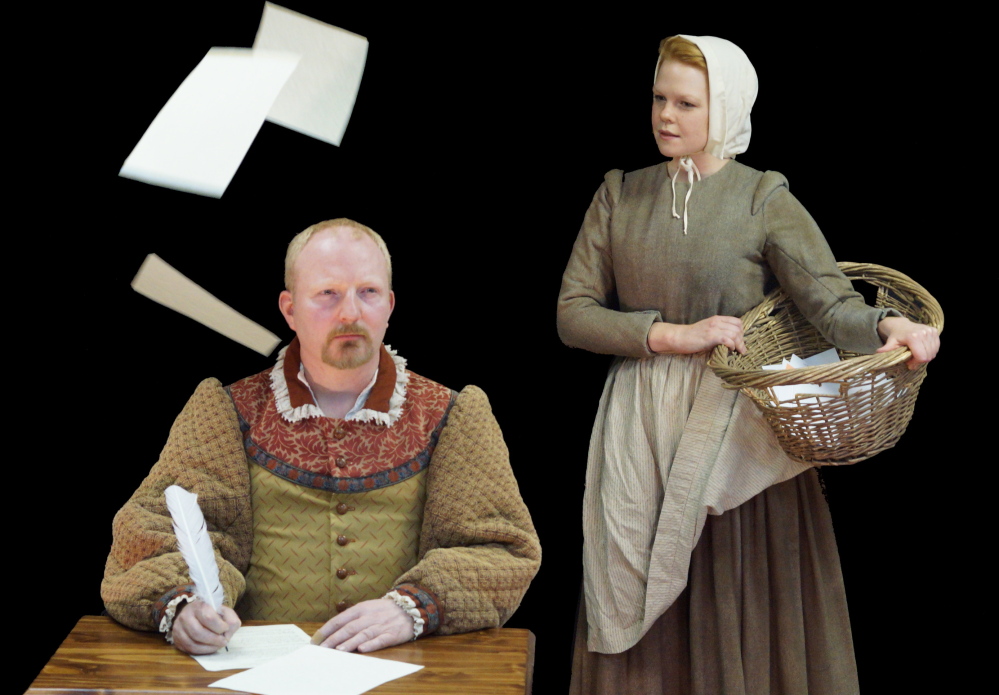Now finishing up its fourth season, the Dramatic Repertory Company has earned a reputation for a willingness to present interesting, substantial works that often make considerable demands on both the players and the audience.
The company’s latest show, a New England premiere, certainly reflects that ambitious spirit. In fact, director Keith Powell Beyland has called it “the largest undertaking in DRC’s history.”
Featuring six principal actors, most in multiple roles, and containing several plays within the play, Bill Cain’s “Equivocation” takes us deep into Shakespearean times for a look at how theater, politics and religion intersect, sometimes with a bang.
Indeed, the play centers around the aftermath of the Gunpowder Plot, an true historical event in which conspirators plotted to blow up Parliament and the King. In Cain’s story, William Shakespeare is hired, under some duress, to write a play that will put a political spin on the event which is favorable to the power-mad and money-hungry establishment.
Shakespeare, his theater company and family struggle with the effort. They believe their art is being compromised but fear the potentially career-ending, perhaps life-threatening, consequences of going off-script. Parallels to more recent historical events are certainly there to be drawn.
There’s much to ponder in this 2½-hour play, but there are also some laughs. Familiarity with the Bard’s work will be helpful to audience members in understanding some of the humor as well as appreciating the overall scenario. But there’s also enough going on in the moment of the play to appeal to a general audience that’s at least a bit theater-friendly.
Working with such a relatively small stage, the choreography of the production was impressive on opening night. There are sword fights, brawls, scenes of torture and hangings to go along with the general comings and goings of actors who change costumes at the sides of the stage.
The switching of light sources helped to delineate when the play changed perspective or shifted from one level of dramatic remove to another. And an impressive amount of complex dialogue flowed well among players who at one moment might be witches out of “Macbeth” and, at the next, somber jurists, timid actors or drunken soldiers.
Peter Brown, who also co-directed, plays Shakespeare, or Shag, as he’s known in the play. He took the genius through moments of indecision, weakness, sentimentality, befuddlement and resolve as the writer strives to “write a new soul into this country.” Brown’s scenes with Corey M. Gagne, as the ruthless Sir Cecil, were fine examples of verbal jousting, as the adversaries vied to define the rationales and failings of theater, power politics and their own personalities.
Christopher Holt was forthright as both the actor Richard and in the roles his character portrayed. Matt Delamater had his best moments as his prosecutor verbally parried with Holt’s accused priest. Carrie Bell-Hoerth got to tie things up as Shakespeare’s wise and loving daughter Judith.
Special mention must be made of Ian Carlsen, who was given some of the more over-the-top roles and ran with them to provide the best comedy of the show. His King James was simply hilarious – an imperious dolt and lecher with a Scottish burr for the ages.
With all the talent and energy that has gone into this production, the extra effort that’s required of the audience to stay with it does not seem to be asking too much. After all, as the play repeatedly emphasizes, theater is a “cooperative venture.”
Steve Feeney is a freelance writer who lives in Maine.
Send questions/comments to the editors.



Success. Please wait for the page to reload. If the page does not reload within 5 seconds, please refresh the page.
Enter your email and password to access comments.
Hi, to comment on stories you must . This profile is in addition to your subscription and website login.
Already have a commenting profile? .
Invalid username/password.
Please check your email to confirm and complete your registration.
Only subscribers are eligible to post comments. Please subscribe or login first for digital access. Here’s why.
Use the form below to reset your password. When you've submitted your account email, we will send an email with a reset code.